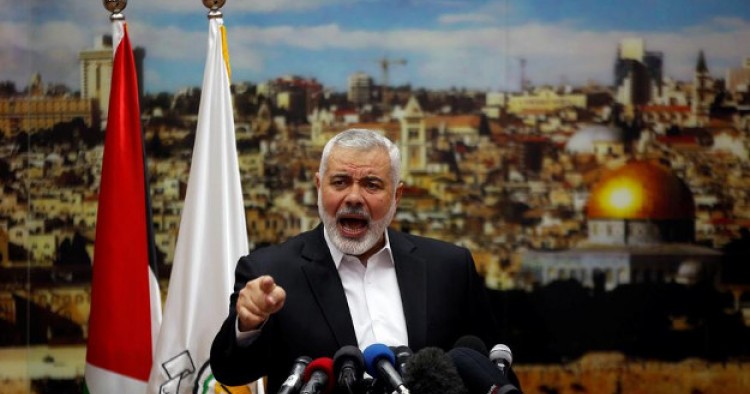In a letter to Iran’s Supreme Leader Ali Khamenei, Ismail Haniyeh, the leader of Palestinian Hamas, has praised Iranian support for the militant group, and particularly Tehran’s “unwavering and valuable” stance on the issue of Jerusalem. According to the Iranian media, Haniyeh denounced President Donald Trump’s decision to recognize Jerusalem as Israel’s capital and emphasized in the letter that launching another intifada against Israel would be the best course of action at present. "With the outbreak of the roaring popular Intifada in the West Bank and al-Quds, we will foil with God's permission the conspiracy of the tyrant of the time and the rulers of hypocrisy in the capitals near and far, who want to put an end to the Palestinian issue." He also thanked Khamenei for his guidance to the “resistance movement” and cautioned that Washington’s Jerusalem announcement was part of a broader “conspiracy” to “destroy the pillars of resistance” and pave the way for Israel’s normalization of relations with the Islamic countries in the region.
Comment: Iranian leaders have been trying to exploit Trump’s decision to recognize Jerusalem as Israel’s capital to further strengthen Tehran’s ties with the Palestinian militant groups. Soon after Trump’s announcement, both President Hassan Rouhani and Quds Force Commander Qassem Soleimani called leaders of Hamas and other Palestinian militant groups to pledge Iran’s “all-out support” for their struggle against Israel. “We are confident that a new intifada will continue its path to attain the rights of the Palestinian nation,” Rouhani told Haniyeh over the phone, according to the Iranian media. Meanwhile, Soleimani told the leadership of the Palestinian Islamic Jihad and Izz ad-Din al-Qassam Brigades that other groups within the “resistance axis in the region” are also ready to defend the al-Aqsa mosque in Jerusalem.
One the one hand, Tehran is portraying itself as the “real” defender of Sunni Palestinians in an effort to change the regional perception that it is promoting a sectarian agenda by aiding only Shiite armed groups in the Middle East. Tehran also hopes that Washington’s decision to unilaterally declare Jerusalem as Israel’s capital would help Iran’s efforts, as one analyst wrote in IRGC-affiliated Tasnim News Agency, to further strengthen the “resistance front” in the region against the United States and Israel.
The read-out of Soleimani’s phone call did not disclose which regional groups the Quds Force commander was referring to as willing to help the Palestianian struggle against Israel, but several Iranian-supported regional Shiite groups have recently expressed readiness to join the fight against Israel once the battle against ISIS in Iraq and Syria is over. These groups include the Lebanese Hezbollah, Afghan Fatemiyoun Division, and Iraqi militia groups such as Harakat al-Nujaba and Asa’ib Ahl al-Haq.
Many Iranian leaders also claim that Trump’s decision justified their views that the only way to achieve a Palestinian state is through armed “resistance” rather than diplomacy. Ayatollah Ahmad Khatami, an aide to Khamenei, called for an uprising against Israel. “With this decision, Trump rejected all negotiations of the past seven decades and demonstrated that the only and only way to achieve the Palestinian aspiration is through intifada, which would change the Zionist regime’s daylight into a dark night. You should rage against this occupying regime; and the more you inflict damage to this usurper and criminal regime, the closer you have taken a step toward pleasing God,” he told worshipers during today’s Friday prayer in Tehran.
After a period of tension and uncertainty, Tehran and Hamas recently took steps to improve their relationship. The Hamas leadership’s decision not to support the embattled regime of Bashar al-Assad and to move closer to Saudi Arabia and Qatar had soured the militant group’s ties with Iran. Tehran may be finding a solace now that Hamas is returning to the Iranian orbit. In October, a senior Hamas delegation visited Tehran and met with top Iranian leaders as the militant group in control of Gaza reached a reconciliation agreement with its Palestinian rival Fatah, which runs the West Bank.
The Middle East Institute (MEI) is an independent, non-partisan, non-for-profit, educational organization. It does not engage in advocacy and its scholars’ opinions are their own. MEI welcomes financial donations, but retains sole editorial control over its work and its publications reflect only the authors’ views. For a listing of MEI donors, please click here.












